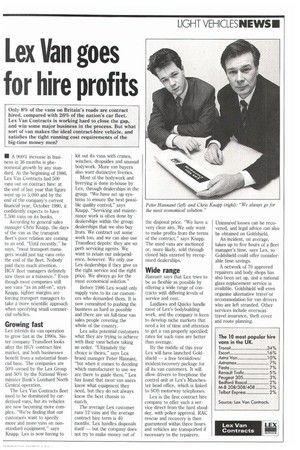Lex Van goes for hire profits
Page 25

If you've noticed an error in this article please click here to report it so we can fix it.
Only 8% of the vans on Britain's roads are contract hired, compared with 26% of the nation's car fleet. Lex Van Contracts is working hard to close the gap, and win some major business in the process. But what sort of van makes the ideal contract-hire vehicle, and satisfies the tight running cost requirements of the big-time money men?
• A 900% increase in business in 36 months is phenomenal growth by any standard. At the beginning of 1986, Lex Van Contracts had 500 vans out on contract hire: at the end of last year that figure went up to 5,000 and by the end of the company's current financial year, October 1990, it confidently expects to have 7,500 vans on its books.
According to general sales manager Chris Knapp, the days of the van as the transport fleet's poor relation are corning to an end. "Until recently," he says, "most transport managers would just tag vans onto the end of the fleet. Nobody paid them much attention. HGV fleet managers definitely saw them as a nuisance." Even though most companies still see vans "as an add-on", says Knapp, tighter margins are forcing transport managers to take a more scientific approach when specifying small commercial vehicles.
Growing fast
Lex intends its van operation to grow fast in the 1990s. Sister company Transfleet looks after the HGV contract-hire market, and both businesses benefit from a substantial financial base. The companies are 50% owned by the Lex Group and 50% by the National Westminster Bank's Lombard North Central operation.
The Lex Van Contracts fleet used to be dominated by carderived vans, but its vehicles are now becoming more complex. "We're finding that our customers want to specify more and more vans on nonstandard equipment," says Knapp. Lex is now having to kit out its vans with cranes, winches, dropsides and unusual bodywork. More van buyers also want distinctive liveries.
Most of the bodywork and liverying is done in-house by Lex, through dealerships in the group. "We have set up systems to ensure the best possible quality control," says Knapp. "Servicing and maintenance work is often done by dealerships within the group; dealerships that we also buy from. We contract out some work too, and we can also use Transfleet depots: they are superb servicing agents. We want to retain our independence, however. We only use Lex dealerships if they give us the right service and the right price. We always go for the most economical solution."
Before 1986 Lex would only supply vans to its car customers who demanded them. It is now committed to pushing the business as hard as possible and there are six full-time van sales people covering the whole of the country.
Lex asks potential customers what they are trying to achieve with their vans before taking an order. "Ultimately the choice is theirs," says Lex brand manager Peter Hannant, "but when it comes to deciding which manufacturer to use we are there to guide them." Lex has found that most van users know what equipment they need, but they do not always know the best chassis to match.
The average Lex customer runs 12 vans and the average contract hire term is 40 months. Lex handles disposals itself — but the company does not try to make money out of the disposal price. "We have a very clear aim. We only want to make profits from the terms of the contract," says Knapp. The used vans are auctioned or, more likely, sold through closed bids entered by recognised dealerships.
Wide range
Hannant says that Lex tries to be as flexible as possible by offering a wide range of contracts with differing levels of service and cost.
Laidlaws and Quicks handle most of Lex's bodybuilding work, and the company is keen to develop niche markets that need a lot of time and attention to get a van properly specified; rates for such vans are better than average.
By the middle of this year Lex will have launched Goldshield — a free breakdown/ incident/recovery package for all its van customers. It will allow drivers to freephone the control unit at Lex's Manchester head office, which is linked to SOS motorway telephones.
Lex is the first contract hire company to offer such a service direct from the hard shoulder, with police approval. RAC rescue and recovery is then guaranteed within three hours and vehicles are transported if necessary to the repairers. Uninsured losses can be recovered, and legal advice can also be obtained on Goldshield.
An incident, on average, takes up to five hours of a fleet manager's time, says Lex, so Goldshield could offer considerable time savings.
A network of 70 approved repairers and body shops has also been set up, and a national glass replacement service is available. Goldshield will even organise alternative travel or accommodation for van drivers who are left stranded. Other services include overseas travel insurance, theft cover and route planning.
































































































































